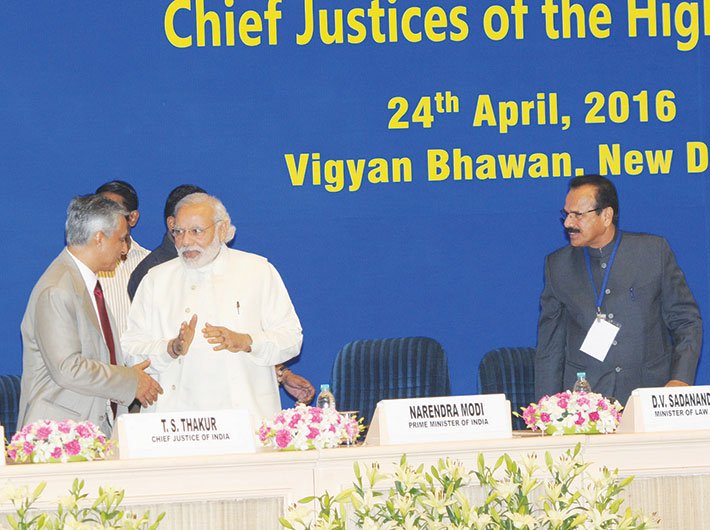The pile of pending cases is a good argument to stop the colonial practice of summer breaks in the judiciary. However, there are also good reasons why it has continued
“My Lords, yours is a strange world indeed. Your year comprises of five months, your week comprises of five days and your day comprises of five hours.”
It was 1866 when Lord Chelmsford, the viceroy and the governor general of India said those words while inaugurating the Allahabad high court. Now, the foremost judicial institution of Uttar Pradesh completes 150 years of existence, and so does the debate over long court vacations.
This year was no different. Chief justice of India, TS Thakur, spoke of taking up some work even during the two-month vacation of the supreme court – which will remain closed for regular work from May 16 to June 28 this year. Inaugurating the new Lucknow bench of the Allahabad high court on March 19, he said, “I would suggest that if the counsels of both parties are willing, then I would request the chief justice of the high courts to allow such hearings during the summer holidays and would also request judges to hear and finalise these cases.”
Time and again, many CJIs have spoken in favour of curtailing or doing away with summer vacations. However, the executive and the judiciary have failed to reach a consensus in breaking a practice incepted during the colonial rule.
A legacy of the British era, the court used to sit only for five months since most of the judges were Europeans and would leave for England when it got unbearably hot for them here in India. Over the years, the legal framework has changed though. The apex court enjoys a summer vacation of close to two months from mid-May while high courts remain close for one and a half month and district courts for a fortnight.
The question, however, remains whether the practice of summer vacation is appropriate in the present context or not. And does the vacation
serve its purpose at different levels of judiciary? Two main factors in the debate over the summer vacation are the pendency of cases in the courts and the need of the judiciary and the legal fraternity to take a break from the overburdening workload.
“Though critical, the issue is subjective as well. Judges and lawyers should not be looked from the spectacle of other professions. Their job is unique in itself,” says Anish Dayal, a supreme court lawyer. That is true: judges and lawyers start the day at 10 in the morning and continue working till late in the evening, preparing case for the next day. Analysing the situation from a judge’s point of view, a break once a year is welcome, for what they do is mentally taxing. Judges and lawyers agree that to retain the efficiency and output, break is important.
But can the nation afford a long break in courts when so many pending cases are piling up?
Former chief justice VN Khare told Governance Now, “Vacation is a time for judges to think about the nitty-gritty of some crucial cases. Litigants seek speedy justice. But at the same time, hurried justice is buried justice. Writing a fair judgment is equally important for it requires intense thought process.”
Justice Khare adds, “Amid all the criticism, we are failing to understand that the judiciary needs to be strengthened before new legislations are introduced. Every time a new legislation is passed in parliament, we need to study its effect on the functioning of the judiciary. Ironically, this is nowhere taken into consideration. Perhaps we are struggling with heavy pendency of cases.”
To dispose of the cases, certain reforms are required. Apparently, the focus is not in searching real solutions to decrease the pendency rate. “Cases can be disposed off if we keep 40 judges per million [of population]. More so, an investment to the tune of '9,000 crore is required to clear off all the arrears, which can ensure smooth functioning of the judiciary,” says the former CJI.
Notably, there are more than three crore cases pending in courts and more and more cases are added every year – on average 15 lakh cases of road accidents and 33 lakh cases related to fraudulent banking practice are bound to be added.
Occasionally, suggestions have been made for an alternative leave mechanism. In 2014 the then CJI RM Lodha in a letter to the Bar Council of India (BCI), said: “We have 365 days’ availability of medical and health services. Why cannot this happen in our field?” His aim was to increase the number of working days and bring down the number of sitting benches. In 193 days, 15 benches hear cases, but if 10 benches sit throughout year, there would be an increase of 26 percent in the hearing.
The law commission, in its 230th report – on judicial reforms, recommended that the vacation period of all the courts could be shortened by 10-15 days. It recommended extending the working hours by half an hour. But, the report is gathering dust.
Currently, there is a vacation bench both in the apex court and high courts. A couple of court rooms remain functional to dispose off urgent cases like those of arrest or bail, demolition, and child custody. Such cases are taken up on urgent basis. In addition, there are a few important and long cases which are put up for disposal via day-to-day hearing.
For example, last year, the supreme court continued to hear a petition challenging the National Judicial Appointments Commission (NJAC) Act, which sought to give politicians and civil society a final say in the appointment of judges.
Keep aside pendency, both lawyers and judges are of the opinion that for quality judgment to be pronounced, vacations are important. “One should not completely reinforce the idea of putting an end to the vacation system. There could be a rotation mechanism where 50 percent of the court continues to be functional,” says Dayal.
What cannot be overlooked is the role of the executive in handling the critical issue. According to Khare, irony is that the executive is insensitive towards the judiciary. “Those talking in parliament about reforms in the legal system are themselves caught in a legal battle. Therefore, they lack an inner desire to bring about any change in the functioning of the judiciary – even if it is about ending the vacation system,” says Khare.
In high courts as well as the supreme court, litigants often prefer adjournments. “One cannot argue that lawyers do not want to work. Almost 50 percent litigants want the matter to be delayed. Therefore, they do not have any issues with the vacation system,” says Abhijat, secretary of the Delhi High Court Bar Council.
The condition is slightly different in district courts. Lawyers there are dependent on income from petitioners. Therefore, their financial imperative pits them against the concept of vacations. “For those who are sufficiently employed as a lawyer, the summer vacation is never an issue. But there are lawyers who are dependent on the petitioner’s fees after each hearing to sustain their livelihood,” says advocate Raju Porwal, additional district government counsel (criminal), Kanpur Dehat.
Clearly, the debate reflects a lack of consensus among the stakeholders. Any decision on holiday restructuring can only come if judges, lawyers and members of executive board together frame an apt mechanism to deal with the national backlog of cases.
The vacation debate plays out at the highest level
The court vacation was the subject of a debate of sorts at the highest level: between chief justice of India TS Thakur and prime minister Narendra Modi. At the inauguration of a joint conference of chief ministers and chief justices of high courts at New Delhi on April 24, Modi broached the topic, recalling what he had said during one such conference when he was the Gujarat CM. “Once I said how about increasing the working hours of courts? How about reducing vacations? I invited trouble. During lunch break, many judges caught me and asked me, ‘How can you say so?’” Later, during an informal interaction with the media, CJI Thakur replied to the PM’s remarks. “Do you think we go to Manali or some other hill stations to enjoy ourselves? Let me first tell you it is only three weeks’ break. Who will write the judgments, especially the constitution bench judgments?” the Indian Express quoted him as saying. The PM should instead urge the lawyers to come forward to argue in vacation as judges are always ready to sit during the break, he said. “His advice should be to the Bar.”
[email protected]
(The article appears in the May 1-15, 2016 issue)

